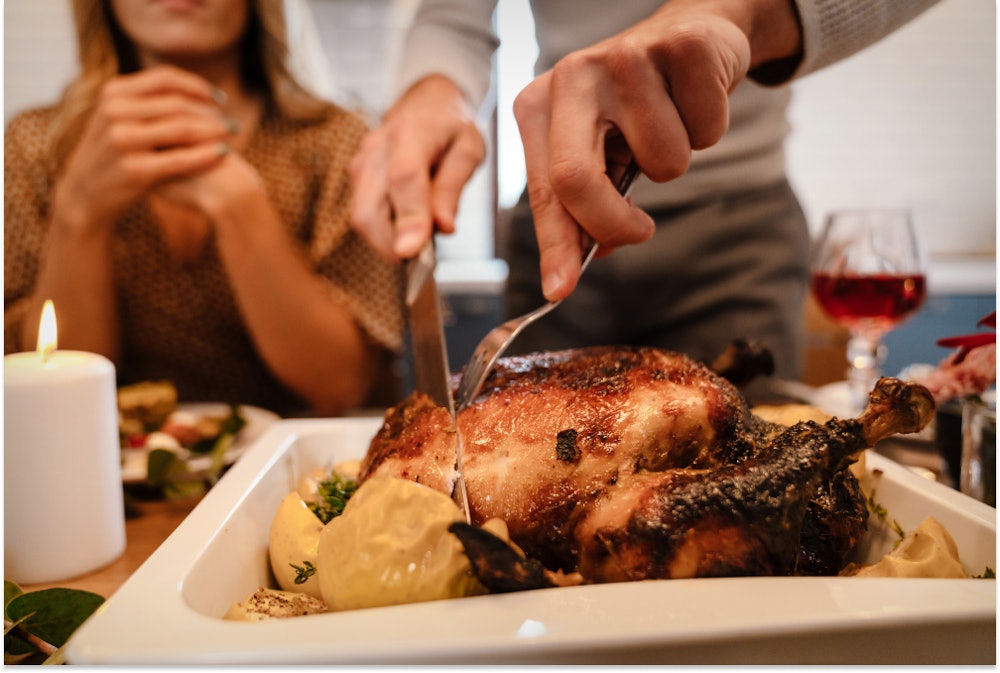- Eating Leftovers Safely
- How to Tell If Leftover Turkey Has Gone Bad
- Other Thanksgiving Leftovers (When Are They No Longer Safe to Eat)
- Unsure What to Do with Your Leftover Turkey?
- Thanksgiving Leftovers To Avoid
If stored in the fridge, leftover turkey will only be good for 2-4 days max. If frozen, you'll have about 2-3 months before the turkey will no longer be safe to eat.
Eating Leftovers Safely
Making sure you eat your Thanksgiving leftovers before they go bad isn't the only thing you need to worry about. You also need to make sure you're storing and reheating it properly.
Leftovers should only be left at room temperature for 2 hours max.
Storing Leftover Turkey
Before cramming your leftovers into your fridge, make sure you've given them time to cool first. All food should be at room temperature before refrigeration, or you risk it being contaminated with salmonella.
Additionally, you should store your leftovers in airtight containers to help keep bacteria out.
Reheating Leftovers
Reheating your leftovers is equally important to ensure you don't end up with a nasty bout of food poisoning.
It's recommended that you reheat your leftover turkey to at least 165 degrees before eating it, and make sure it stays at this temperature for at least 2 minutes. Reheating your turkey (and other Thanksgiving leftovers) will help eliminate any harmful bacteria and viruses.
Leftovers should only be reheated one time for a couple of reasons:
- Reheating it multiple times will encourage bacteria growth
- The nutritional value of the food diminishes
How to Tell If Leftover Turkey Has Gone Bad
If you're unsure whether your leftover turkey or other Thanksgiving dishes are still safe to eat, there are two key things to do before consuming it:
- Do a smell test: If your leftovers smell sour or don't smell as they should, it's best to trash them.
- Inspect it closely: Do the leftovers look like they should? Is the color a bit off, or does it look slimy at all? If so, the food is no longer safe to eat.
Other Thanksgiving Leftovers (When Are They No Longer Safe to Eat)
| Thanksgiving Leftover | Refrigerated | Frozen |
| Turkey (cooked) | 2-4 days | 2-3 months |
| Ham | 3-4 days | 1-2 months |
| Gravy | 1-2 days | 1 year |
| Cranberry sauce | 4 days | 2 months |
| Stuffing | 4 days | 1 month |
| Green bean casserole | 4 days | n/a |
| Sweet potato casserole | 5 days | 1 year |
| Mashed potatoes | 5 days | 1 year |
| Pumpkin pie | 4 days | 2 months |
| Apple pie | 3 days | 2 month |
Unsure What to Do with Your Leftover Turkey?
There are plenty of uses for your leftover turkey after Thanksgiving. Rather than just recreating Thanksgiving dinner all over again, here are some ways to eat the rest of your turkey before it spoils:
- Bundle all of your leftovers together to make the ultimate Thanksgiving sandwich.
- Create an entirely new turkey casserole dish (if you're not casserole'd out!).
- Add the turkey to pasta for a new hot dish.
- Mix the turkey and leftover stuffing together to make turkey stuffing meatballs (then dip into your leftover cranberry sauce).
- Bake yourself a delicious turkey pot pie.
- Make a turkey noodle soup to keep you warm.
- Make turkey enchiladas as a twist on a Mexican favorite.
Thanksgiving Leftovers To Avoid
Although some Thanksgiving foods can be eaten after refrigerating and reheating, there are some you may want to think twice about, including:
- Mushrooms (commonly in green bean casserole): Can give you a stomach ache.
- Potatoes: Can cause botulism.
- Fried foods: Reheating oily foods can create toxins.
- Carrots: Reheating can create carcinogens.
- Celery: Reheating can create carcinogens.
Don't leave your Thanksgiving food out for too long, or none of it will be safe to eat anymore. Refrigerate any leftovers after they've been left at room temperature for two hours.


Comments